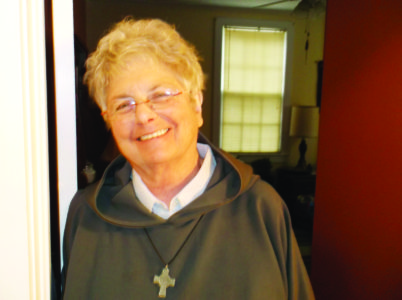
Sister alies therese
FROM THE HERMITAGE
By Sister alies therese
“It has been said that ‘a person is enlightened,’ not ‘when they get an idea’, but ‘when someone looks at them.’ For God, to gaze is to love, and to work favors.’ These eyes are effective: ‘God’s gaze works four blessings in the soul: it cleanses the person, makes her beautiful, enriches and enlightens her.’” (The Impact of God, Father Iain Matthew, OCD)
If anyone has ever looked at you with eyes of love you know how disarming and how beautiful it is. Others have scorned you or ‘looked right through you’ and somehow you have been demeaned or rejected. Sometimes, though, it gets all mixed up!
“On their golden wedding a couple were busy all day with celebrations. They were grateful when evening came and they were alone on the porch watching the sunset. The old man gazed fondly at his wife and said, ‘Agatha, I’m proud of you!’ ‘What did you say? asked the old woman. ‘You know I’m hard of hearing,.. say it louder.’ ‘I said, I’m proud of you.’ ‘That’s all right,’ she replied a bit dejected, ‘I’m tired of you too!’ (deMello,1997)
Oops…
If we have learned to love, to share that love with others, and have learned to receive what others offer us, we have moved deeply into the mystery of the universe: unconditional love. Sometimes we jump at what we know or what we think we know, very conditional. Sometimes we offer ourselves to a kind of quick wisdom that lasts but a moment and then flits away. Clearly, whatever it is we need to learn to gaze at takes a lifetime. Perhaps it will be through art or writing, reading or hugging, trusting or praying that we will discover this gaze. It is this gaze that we want to desire to share with others.
“Some people will never learn anything because they grasp everything too soon. Wisdom, after all, is not a station you arrive at but a manner of traveling. If you travel too fast, you will miss the scenery. To know exactly where you’re headed may be the best way to go astray. Not all those who loiter are lost.” (deMello,1997)
Wisdom comes from various places. Like this five-year-old who, when asked, reported: “Solomon had 300 wives and 700 porcupines.” Really? Things can get very mixed up. Another child, a six-year-old, reported: “The first Book of the Bible is Guinessis in which Adam and Eve were created from an apple tree.” OK? Really? Where do we get our wisdom information? We know when we stare blankly at the 24-hour news cycles we will get information or alternate facts, but will we be any the wiser?
The gaze of love is a theme frequented in mystical literature. In the 14th Century, Julian of Norwich explored this notion in her book Revelations of Divine Love. There are many examples in her writings but let’s consider this one in Chapter 50:
“But I still marveled … Good Lord, I see You, who are truth itself, and I know that we sin grievously all the time, yet You show us no blame … between these two contraries my reason was greatly belabored by my blindness … my longing endured as I continued to gaze at Him.”
In her book of 1993, Sister Wendy (d.2018) The Gaze of Love, Meditations on Art, she asks us to learn to look with love, not only at things, but at art, one another, and certainly in prayer. She says this: “Prayer is God’s taking possession of us. We expose to Him what we are, and He gazes on us with the creative eye of Holy Love. His gaze is transforming: He does not leave us in our poverty but draws into being all we are meant to become. How God gazes is not our business. We are only asked to let Him take possession. If we want God to be our all, then we shall want to do whatever pleases Him … holiness means seeing the world through God’s eyes.” This would be true wisdom, not just information or facts. These, as we’ve seen, can easily get us confused.
On the announcement board outside the Church we find: Morning Sermon: Jesus Walks on Water. Evening Sermon: Searching for Jesus. Oops. Gaze upon someone with love and as Valentine’s Day is just a day, make it when you can risk coming out from behind your barriers. Let yourself be loved into freedom!
BLESSINGS.
(Sister alies therese is a vowed Catholic solitary who lives an eremitical life. Her days are formed around prayer, art and writing. She is author of six books of spiritual fiction and is a columnist. She lives and writes in Mississippi.)
